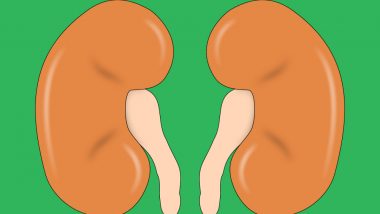he COVID-19 pandemic is throwing up new challenges every day for the healthcare system. Patients with damaged kidneys, also known as uremic patients, are particularly vulnerable to the coronavirus infection.
Patients with such comorbidities may exhibit more significant variations in clinical symptoms and infectivity. Plus, the disease presents particular challenges for patients with chronic kidney disease stage-5 on dialysis and those who receive regular haemodialysis. Here's how coronavirus affects kidneys and how you can keep your organ functioning well.
How Does COVID-19 Effect Kidneys?
It is typically perceived that COVID-19 virus is borne from respiratory systems and lungs. But a growing body of evidence has shown that the virus also attacks the kidneys either directly or by an excessive immune response in severe COVID-19 patients. World Kidney Day 2020: Why Do You Need a Kidney Detox? Here's How to Cleanse the Organ Safely and Effectively!
How to Keep Your Kidneys Healthy?
Cut Down on Salt: Too much salt would mean too much sodium in your blood, which can lead to water retention in the body.Too much water in your system can put pressure on the vascular system and reduce the ability of the kidneys to remove excess fluids. Over time, water retention can put a strain on the kidneys and cause it to fail.
Monitor Blood Pressure: It's essential to keep your blood pressure in check, as high BP can cause damage to the kidneys. Hypertension can harden, narrow or weaken the blood vessels around the organs, leading to kidney failure.World Kidney Day 2020: From Red Bell Peppers to Pineapple, Here Are Top Five Foods As per Renal Diet for Healthy Kidneys.
Keep Diabetes In Check: Don't be in denial about your diabetes status and regularly monitor your blood sugar levels. Take proper medication, exercise and control your diet to keep the sugar levels in check. Uncontrolled diabetes can wear out the kidneys and lead to failure
Manage Stress: Don't let stress take control of your life or your kidneys. Stress causes the blood pressure to shoot up, putting a strain on the organs. If you can't escape stress, manage it with regular meditation, recreation, exercise and proper sleep
Limit Protein Intake: High protein intake leads to the formation of ammonia and nitrogen. The kidneys have to work extra hard to get rid of these compounds. Instead of going off protein ultimately, make sure you limit its consumption. World Kidney Day 2020: What are Kidney Stones and How to Prevent Them?
If you are on dialysis and have been suspected to be in contact with COVID-19 patient, you must follow strict protocols to minimise the risk to other patients and healthcare personnel.
(The above story first appeared on LatestLY on May 25, 2020 12:06 PM IST. For more news and updates on politics, world, sports, entertainment and lifestyle, log on to our website latestly.com).













 Quickly
Quickly




















